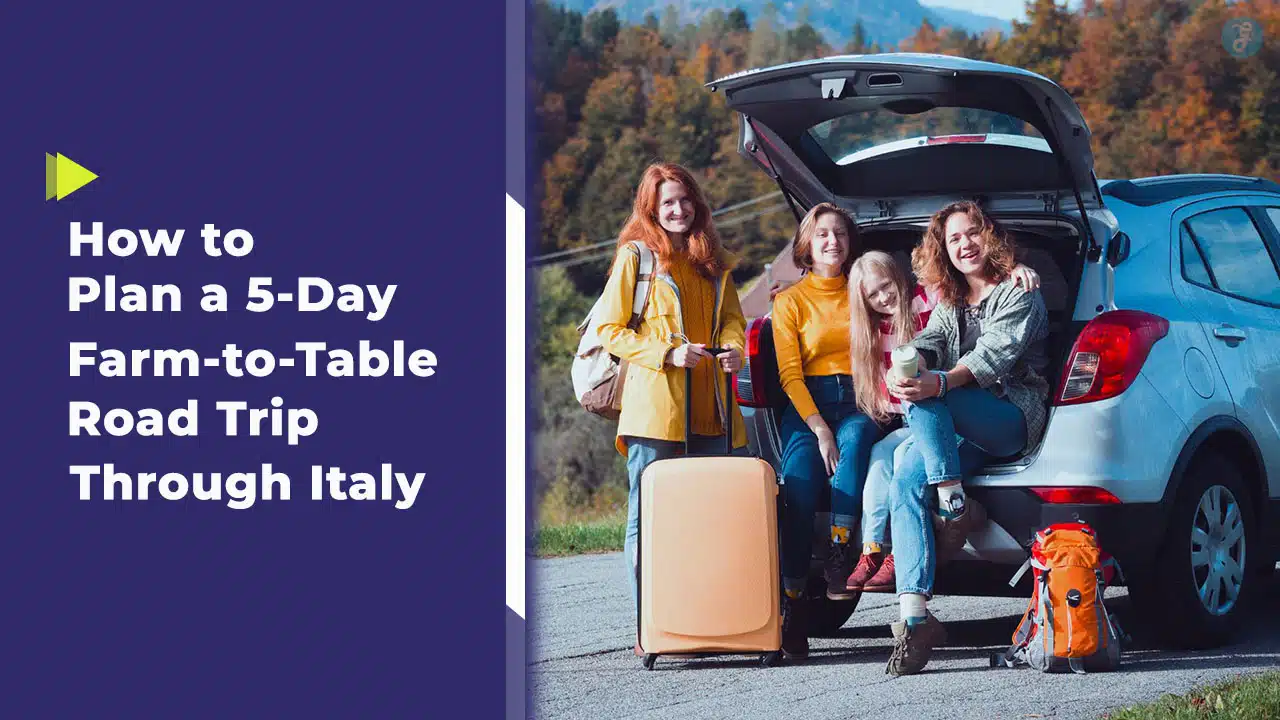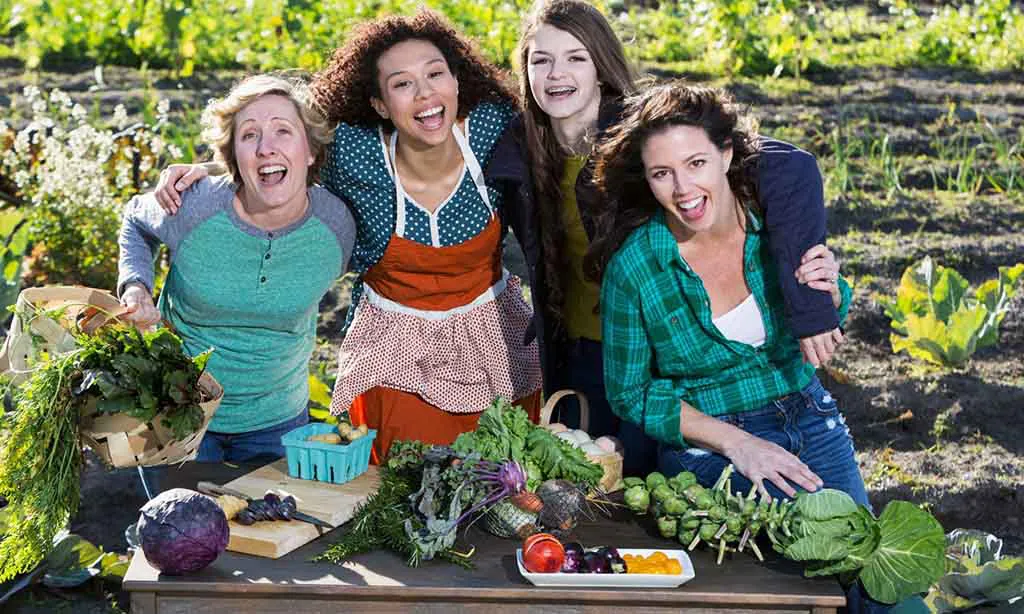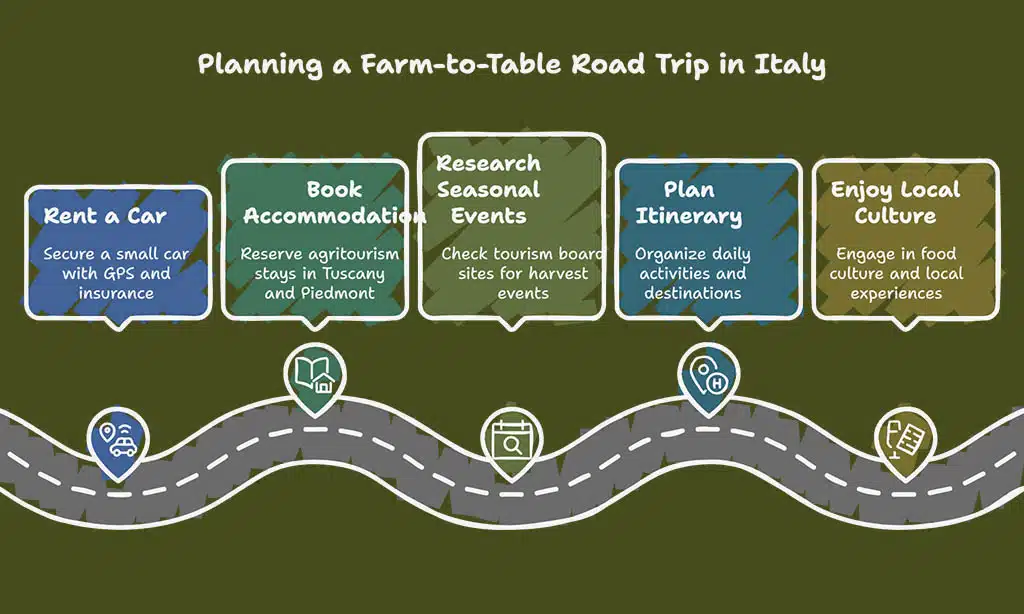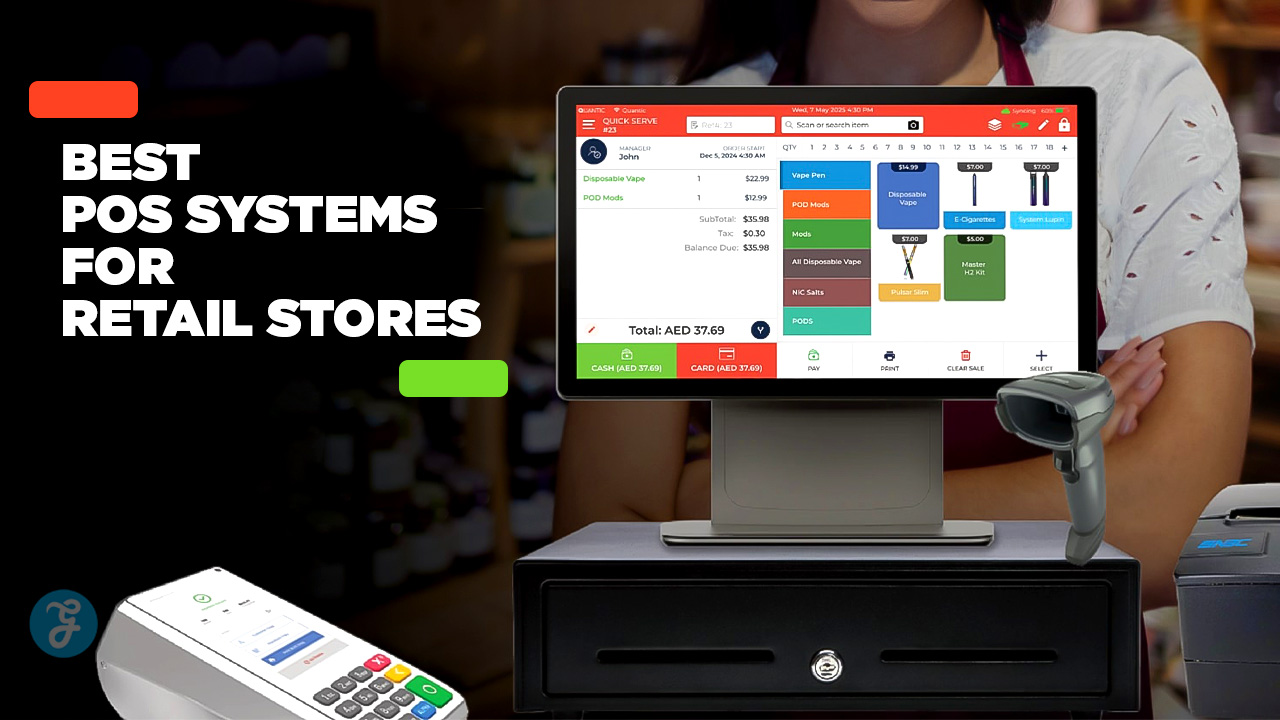Many dream of a farm-to-table trip but feel lost in all the details. You want fresh olive oil from the tuscan hills and cooking classes in a Florence kitchen by the Ponte Vecchio. You wonder how to fit truffle hunting and meals in Piazza Grande into one trip.
You need a clear, day-by-day plan.
Italy has more than 20 wine regions alive with Italian wine and local food culture. This guide maps a 5-day trip from the tuscan vineyards to markets by the Trevi Fountain. You will hunt truffles in Umbria, make pecorino cheese in Emilia-Romagna, and taste pastas near San Gimignano.
You will rent a car, fill out the passenger locator form, and book farm stays. Ready to roll?
Key Takeaways
- Map a clear 5-day route from Tuscany to Rome.Day 1: taste Chianti Classico and Brunello in Val d’Orcia and tour an olive grove near Volterra.Day 2: take a 3-hour cooking class in Florence with Val d’Orcia ingredients, then dine at La Terrazza by Ponte Vecchio.Day 3: hunt black truffles near Norcia with Marco and his hound Luna, then stay at a working farm near Arezzo for milking, egg gathering, and pecorino making.Day 4: join a Parmigiano Reggiano workshop in Parma and enjoy the October harvest festival in the Chianti Hills.Day 5: wander Campo de’ Fiori market and savor cacio e pepe near the Pantheon.
- Book a rental car with GPS and full liability coverage.Carry a valid driver’s license and International Driving Permit.Avoid ZTL zones in city centers to skip fines.
- Reserve agriturismo stays in advance on agriturismo.it or TripAdvisor.Look for farms that press olive oil, age pecorino cheese, and run cooking classes.
- Check regional tourism sites for key dates.Note olive oil fairs in Cinque Terre, balsamic events in Modena, grape tastings near Parma, and harvest demos in Piazza Grande.
- Pack a maps app and a crop guide.Chat with local farmers, pour a glass of Chianti, and keep your camera ready for sunlit vineyards, farm kitchens, and brass-band festivals.
Day 1: Begin Your Journey in Tuscany
Your road trip kicks off amid rolling hills in Val d’Orcia, where you sample ruby-red wine, chat with winemakers, and snap photos with your camera. You then wander through an olive grove, taste fresh oil, and imagine it drizzled over warm bread.
Explore local vineyards and enjoy wine tastings
Rolling hills host farmhouses and neat vine rows. A guide leads you through Chianti vineyards near San Gimignano. You spot cypress, olive groves, and grape clusters. You sniff ripe grapes, learn organic pruning methods.
A tasting notebook helps track flavor notes.
Wine tastings feature Chianti Classico and Brunello di Montalcino. You sip slowly, note cherry, leather, herb aromas. Crew pair sharp pecorino cheese with bold red. The sky glows pink, you soak in Tuscan food culture.
Visit an olive grove for a traditional olive oil tour
Shadows dance beneath gnarled Olea europaea on a sunlit hillside near Volterra. A local farmer leads a tour through an old frantoio press at an olive oil mill. He shows stainless steel presses, millstones, and wooden racks.
You taste fresh extra virgin olive oil, drizzling it on pecorino cheese and slices of cured meats. A swirl of fruity top notes lingers on your tongue like a green-gold elixir.
The grove sits just past a medieval village and the St. Francis sanctuary. Stone cottages and roofs with red tile frame the rolling hills of Val d’Orcia. You learn how locals guard the harvest from mid-October through November, using pit buckets, rake combs, and mechanical shakers.
You walk between rows of leccino and frantoio cultivars, breathing in the scent of earth and citrus. A glass of Chianti follows, and a lighthearted chat with the host seals the memory.
Day 2: Farm-to-Table Cooking in Florence
You chop bright tomatoes and leafy herbs with a blade, laugh at a chef’s jokes, and taste peppery olive oil as it drips off a slice of bread. Later, you swirl homemade pasta in a pan, chat with local growers, and sip Chianti under glowing string lights in a cozy courtyard.
Take a hands-on cooking class using fresh, local ingredients
Local chefs in Verona lead a pasta and risotto cooking masterclass. They source durum wheat, olive oil, and seasonal ingredients from Val d’Orcia farms. Students knead dough on a cutting board, feed it through a pasta machine, then stir saffron risotto in a pan.
Instructors share tips on grating pecorino cheese and chopping fresh basil with a knife. Classes last three hours and seat up to 12 people.
Those cooking classes bring Italian cuisine to life with ripe tomatoes and cured meats. Students plate dishes with local meats, drizzle the final olive oil, and taste each bite. They swap stories over wine from Cinque Terre.
The chef jokes about al dente timing as a rite of passage.
Dine at a renowned farm-to-table restaurant
La Terrazza sits near Ponte Vecchio, with a peek at Cattedrale di Santa Maria del Fiore. Chefs start at dawn to pick herbs, heirloom tomatoes, and pecorino cheese. They drizzle olive oil from Val d’Orcia over crisp salad.
You sip Chianti Classico as candlelight warms the room. The menu reflects seasonal ingredients.
A friendly waitress shares tales of florentine markets, and you nod as you taste fresh pasta. You giggle about that moment when the gelato cart rumbled past, nearly stealing the scene.
Candlelight warms your cheeks as you chat about cooking classes near Via del Portico d’Ottavia. Every bite feels like a love note to italian cuisine.
Day 3: Truffle Hunting and Agritourism in Umbria
Guides lead you and hounds into oak groves near Norcia to seek out black truffles hiding beneath leaf litter. Back at a farmhouse inn, you tuck into soft curd cheese and olives, and swap stories with the farmers under lantern light.
Join a guided truffle hunting adventure
Dawn mist drapes the rolling hills in Umbria. Marco leads the truffle hunting trek, rake and basket in hand. Luna, his truffle hound, sniffs the damp earth. She scrapes at an oak root and uncovers a firm black truffle.
You hold it in your palm, rich scent rising, forest memories swirling.
Back at the farm, you slice truffle-flavored prosciutto and salami. You layer thin shavings over pecorino cheese, bread and olive oil. You sip a glass of local red, taste seasonal ingredients, celebrate Italian cuisine.
Laughter spills across the table, food culture shining in every bite.
Stay overnight at a working farm offering agritourism experiences
Farmhand tasks start at 7 am in a hilltop villa near Arezzo. A five-night villa stay places you at a working farm in Tuscany. Milking animals and gathering eggs makes every morning feel real.
A cooking session guides you to craft pecorino cheese. You blend local olive oil into warm vegetable soups. You explore food culture in every bite. Plates brim with cured meats and seasonal ingredients.
An agrigento ruins visit adds wonder to a farm day.
Day 3 takes you to Barolo in the Langhe Wine Region. A farmhouse porch offers views of vine rows. You sip ruby-red Barolo wine beside foggy hills. Truffle hunting dogs sniff under trees.
You learn Italian cuisine tactics with truffle shavings. Firelit dinners serve rustic pasta and rich soups. Sleeping in a stone barn brings real agritourism charm.
Day 4: Cheese-Making and Seasonal Festivals in Emilia-Romagna
At a rustic dairy you slam fresh curd into a cheese press like a sculptor shaping marble and learn how they turn milk into prized aged cheese. You roam a bustling piazza, sample sharp pecorino cheese, and tap your feet to lively brass at a harvest festival.
Participate in a cheese-making workshop, learning about Parmigiano Reggiano
You knead fresh curds in a steaming cheese vat. A cheesemaker named Marco guides you through each step. He adds rennet and stirs until whey separates. The farm near Parma uses milk from a dairy herd.
Your hands shape small rounds just like masters in Reggio Emilia. You still remember the cheese tasting in Pienza two days back.
Your group works with a milk pasteurizer and wooden molds. Marco shares tales of wheels aged for twenty-four months. He offers young and aged Parmigiano Reggiano side by side. You note grainy crystals and bold savory notes.
You picture the prosciutto slices you sampled on the Parma day trip. You feel ready for the guided Alba city tour in Piedmont on Day 5.
Experience a local seasonal harvest festival
Local farmers fill rows of booths on the third weekend of October in the Chianti Hills. They offer olive oil, cured meats, pecorino cheese and fresh fruits. Visitors can book a Tuscany wine tour that winds through Chianti Hills and past San Gimignano.
A horn blows to start each tasting.
Piazza visitors watch chefs share cooking demos. They learn to toss seasonal ingredients into a pan. Children chase bubbles under colorful tents. Sunlight glints off vineyard hills by the medieval towers.
Day 5: Discover Rome’s Culinary Heritage
I tap my interactive guide on a handheld screen, head to Campo de’ Fiori, and taste creamy burrata by artichoke stalls. Then I slip into a corner trattoria near the Pantheon, twirl cacio e pepe, and watch dusk paint marble columns rose.
Visit open-air markets sourcing fresh produce
Bargain hunters and chefs line the stalls at Campo de Fiori market in Rome. Vendors sell seasonal vegetables, cured meats, fresh olive oil and ripe tomatoes. You snag a sturdy shopping basket to carry your haul.
Local chefs show artichoke varieties and tasting notes. You soak up food culture, learning quick tips for italian cuisine.
Enjoy a farm-to-table dining experience with Roman specialties
Rome’s open-air markets display bright tomatoes and fragrant basil. Stallholders slice cured meats like prosciutto and salami. Shoppers scoop pecorino cheese from wooden barrels.
Visitors wander past the Jewish Ghetto to a trattoria courtyard near the Trevi Fountain. Hosts drizzle golden olive oil over grilled vegetables. Diners sip local wine under strung lights.
Groups join cooking classes after a Colosseum VIP tour. They master pasta-making with fresh herbs and olive oil. You shape dough in a pizza-making class on Day 6. Farm-to-table meal preparation in Sorrento on Day 2 shows coastal produce.
Chefs explain Italian cuisine and food culture. They weave Sicilian food styles into Roman specialties.
Tips for Planning Your Farm-to-Table Road Trip
Rent a car hire, grab a crop guide, and fire up a maps app, then chase down small farms where fields burst with color. Chat with farmers at a B&B, pour a glass of local vino, soak up the food culture, and keep your eyes peeled for the next tip.
Renting a car and understanding Italy’s driving laws
Pick up a small car at a local agency, add GPS, and choose liability coverage. Italy drives on the right side. Drivers must hold a valid license and carry an International Driving Permit.
ZTL zones in city centers trigger fines if unmarked cars enter. Gas stations remain open seven days with self-service pumps and credit cards.
A rental car helps you reach olive groves, truffle hunting, and rural farms. Public transport cannot serve some remote areas. A handy GPS guides you along farm roads in Umbria and Tuscany.
Advance booking at a car rental agency can cut costs and secure first-class comfort on longer legs.
Booking accommodations at agritourism stays
Book your 5-night agritourism villa in Arezzo, Tuscany. Verify high-season dates, like June or July, to join local harvests. Search agriturismo.it or TripAdvisor for top user ratings.
Look for farms pressing olive oil and aging pecorino cheese. One guest said, “I slept like a log in that villa.”.
Find a farm stay in Barolo, Langhe Wine Region for Day 3. Grab lodging in Colle di Val D’Elsa near Florence. See if hosts offer cooking classes and share italian cuisine lore. Check they serve seasonal ingredients at breakfast.
Researching seasonal events and availability
Tourism board sites list harvest events in Emilia-Romagna. You can see dates for grape tastings near Parma. Check olive oil fairs in Cinque Terre. Find balsamic fairs in Modena. October menus include pecorino cheese demos and cured meats workshops at piazza grande.
Day 6 plans in Langhe-Roero and Monferrato appear on Piedmont’s official site. This tip saves time.
Farm hosts post truffle hunting slots near Umbria hills. You can book a seasonal aperitivo by the Sorrento coast after your Pompeii stop. A mobile app sends alerts for fairs in San Gimignano and Val d’Orcia.
Ask a local restaurateur about cooking classes that focus on Italian cuisine and seasonal ingredients.
Takeaways
This trip shapes up like a feast on wheels. You sip wine in sunlit vineyards and taste fresh olive oil by the bottle. You learn cheese-making moves in a small farm kitchen. You hunt truffles with a guide and sniff out rich aroma.
A map and rental vehicle keep you on track. Each open-air market visit fills bags with crisp produce. A cooking class brings home real Italian flavor. Memories of this road trip will stick like cheese on crust.
FAQs
1. What route should I follow on a 5-day farm-to-table trip?
Start in val d’orcia on day one, soak in rolling hills and farm air. Head to san gimignano on day two for sunset views. On day three, slip into florence, wander the old bridge at dusk. Save day four for coastal villages, sea breeze and simple fare. Wrap up near trevi fountain on day five, maybe toss a coin for good luck.
2. How do I book truffle hunting and cooking classes?
I book truffle hunting in the umbrian hills, with a local guide and a keen hound. Then I sign up for cooking classes in a farm kitchen, they show sicilian cooking and italian cuisine. It’s hands-on, messy and real.
3. What local foods should I taste along the way?
Start with pecorino cheese, nibble cured meats and drizzle olive oil on fresh bread. Hit farmers markets for seasonal ingredients, herbs and ripe fruit. Italian food never tasted so close to the soil.
4. How can I blend history and food in florence and turin?
In the cities of florence, stroll the piazza grande, grab gelato, learn the history of florence at a street café. Then drive north to the capital of piedmont, soak up friday night wine bar vibes. Food and story go hand in hand there.
5. How do I dive into local food culture and culinary traditions?
Chat with farmers at open-air markets, ask about family recipes. Taste italian cuisine that’s steeped in food culture, from cast-iron pots to wood-fired ovens. It feels like a warm hug on a plate.






































